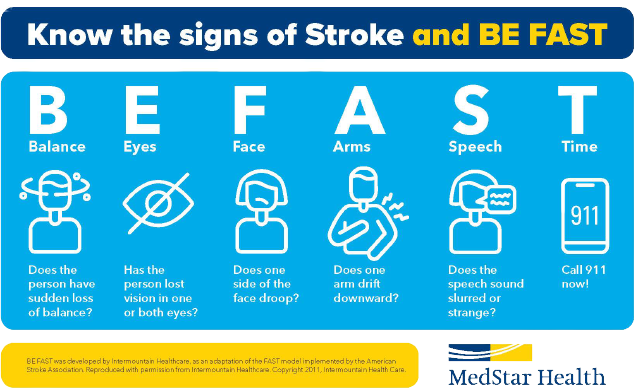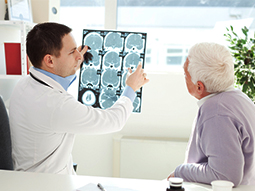Stroke prevention
The risk for stroke increases as people age, but you can lower your risk of a stroke by adopting these healthy behaviors:
- Get your blood pressure checked regularly. Elevated blood pressure (140/90 mm Hg or higher) is a leading cause of stroke. High blood pressure makes your heart work harder to pump blood, putting added stress on the artery walls. Keeping your blood pressure under control with medication and exercise will put less strain on your blood vessels, reducing your risk.
- Quit smoking. Smoking is the most preventable cause of stroke. People who smoke double their risk of having a stroke. Talk with your doctor about smoking-cessation programs to help you quit the habit.
- Eat a low-fat diet. Eating a diet that is high in cholesterol, saturated fat and total fat can create fat deposits in the arteries. A person with a total cholesterol level between 200 mg /dL and 240 mg/dL has an increased risk of stroke. You can lower your cholesterol level and stroke risk by adopting a diet that is low in saturated fats, low in cholesterol and high in fiber.
- Be physically active. Exercising for 30 minutes a day and reducing your intake of fat can help you maintain your desired weight and improve overall health. A lifestyle that does not include regular exercise can contribute to heart disease, which may lead to a stroke.
- Take prescribed medications properly. Medical conditions such as heart disease, diabetes, high blood pressure, or mini-stroke increase your risk of a stroke. Your doctor may prescribe medications to help manage these conditions.
- Do not drink alcohol excessively
Symptoms and warning signs

If you think you or a loved one may be having a stroke, do not wait. Call 911 right away. A stroke happens when blood flow to part of the brain is cut off because a blood vessel becomes blocked or bursts. According to the American Stroke Association, stroke is the leading cause of long-term disability in the United States and the third leading cause of death. The Maryland Stroke Alliance encourages everyone to know the warning signs of stroke. These vary according to the part of the brain being affected but can include:
- Sudden numbness or weakness of the face, arm, or leg, especially on one side of the body
- Sudden confusion, trouble speaking, or difficulty understanding speech
- Sudden vision problems in one or both eyes
- Sudden trouble walking, dizziness, or loss of balance/coordination
- A sudden, severe headache
If you suspect that a loved one may be having a stroke, conduct the “Be F.A.S.T.” quick check:
- B - Balance: Watch for a sudden loss of balance.
- E - Eyes: Is there a sudden loss of vision in one or both eyes? Or double vision?
- F- Face: Ask the person to smile. Does the face droop?
- A- Arm: Ask the person to raise both arms. Does one arm drift downward?
- S- Speech: Ask the person to repeat a simple phrase. Does the speech sound slurred or strange?
- T- Time: If you observe any of these signs, then it's time to call 911.
Stroke risks
Stroke is the third largest cause of death in the United States, the primary cause of disability, and affects people of all ages, gender, and race. The effects of stroke can be devastating. However, specific traits and lifestyle behaviors can increase your risk. Knowing the risk factors and changing your lifestyle can help decrease your risk of having a stroke.
Risk factors include:
- Heavy Alcohol Use
- Age: The risk of stroke increases with age. Two-thirds of all strokes occur in people older than 65, but an increasing number of people between the ages of 40 and 50 are having strokes.
- High Blood Pressure
- Cholesterol
- Diabetes
- Gender: Men are more likely to have a stroke, but women are twice as likely to die from a stroke.
- Heart Disease
- Family History: If an immediate family member had a stroke, your risk increases.
- History of a Previous Stroke or Transient Ischemic Attack
- Physical Inactivity and Obesity
- Race: African-Americans are 1.4 times more likely to die of stroke than Caucasians.
- Smoking
Types of strokes
The two major kinds of stroke are:
- Ischemic stroke is caused by a blood clot, which blocks an artery feeding the brain. When the blood supply is interrupted, that portion of the brain can no longer function.. About 80 percent of all strokes are ischemic. In many individuals, stroke is preceded by transient episodes of diminished blood supply. These transient ischemic attacks provide warning of impending stroke and create an opportunity to intervene before stroke occurs.
- Hemorrhagic stroke results when a blood vessel bursts and leaks blood into the brain. A cerebral hemorrhage occurs when an artery in the brain ruptures, and blood under pressure forces itself into brain tissue. This creates a mass of blood that distorts nearby brain structures and interrupts brain function.
Stroke treatments

Our providers
Expert neurology care
Getting the care you need starts with seeing one of our neurologists.
Patient stories
Our locations
Distance from Change locationEnter your location
MedStar Franklin Square Medical Center
9000 Franklin Square Dr. Baltimore, MD 21237
MedStar Georgetown University Hospital
3800 Reservoir Rd. NW Washington, DC, 20007
MedStar Good Samaritan Hospital
5601 Loch Raven Blvd. Baltimore, MD 21239
MedStar Harbor Hospital
3001 S. Hanover St. Baltimore, MD 21225
MedStar Montgomery Medical Center
18101 Prince Philip Dr. Olney, MD 20832
MedStar National Rehabilitation Hospital
102 Irving St. NW Washington, DC, 20010
MedStar Southern Maryland Hospital Center
7503 Surratts Rd. Clinton, MD 20735
MedStar St Mary's Hospital
25500 Point Lookout Rd. Leonardtown, MD 20650
MedStar Union Memorial Hospital
201 E. University Pkwy. Baltimore, MD 21218
MedStar Washington Hospital Center
110 Irving St. NW Washington, DC 20010









